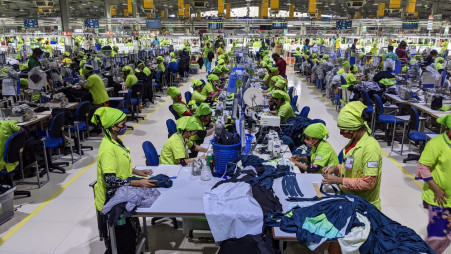'Agendas of graduating LDCs not prioritised in WTO’s ministerial conference'
'Demand to extend LDC-specific S&DTs for a time-bound period ignored'

Highlights
-
Bangladesh as an LDC took the most advantage of LDC-specific trade facilities and, consequently, it has the most to lose from the loss of LDC-specific ISMs
-
Almost 90% of all export losses of 12 graduating LDCs will be on account of Bangladesh
-
The country's export loss due to the loss of preferential market access could be equivalent to about 14.3% of its global export
The country needs to shift from preference-driven competitiveness to skills- and productivity-driven competitiveness to sustain, enhance export performance
The agendas raised by the countries set to graduate from the list of least developed countries (LDCs) to help overcome challenges that will arise after the graduation were not prioritised in the last Ministerial Conference of the WTO, said experts and economists at a dialogue on Sunday.
They also said the meeting held in June this year made no effective decision regarding extending preferential market access, designing a debt relief initiative, formulating a graduation support fund, and some other agenda to prioritise issues including fisheries, subsidies, agriculture.
At the dialogue, entitled "WTO-MC12 Outcomes Next Steps for Bangladesh as a Graduating LDC" arranged in the capital by the Centre for Policy Dialogue (CPD) in partnership with Friedrich-Ebert-Stiftung (FES) Bangladesh, CPD Distinguished Fellow Professor Mustafizur Rahman urged the government to reduce dependency on the WTO and increase efforts to implement FTAs and other trade agreement multi-laterally or bilaterally with potential trade partners.
He said Bangladesh is one LDC that was able to take the most advantage of LDC-specific trade facilities and, consequently, it has the most to lose from the loss of LDC-specific ISMs.
To put things into perspective, almost 90% of all export losses of 12 graduating LDCs will be on account of Bangladesh, he added.
The country's export loss due to the loss of preferential market access could be equivalent to about 14.3% of its global export.
Hence shifting from preference-driven competitiveness to skills and productivity-driven competitiveness is necessary if export performance is to be sustained and enhanced, suggested Dr Mustafizur.
Dr Debapriya Bhattacharya, distinguished fellow of the CPD, said considering the economy and population, Bangladesh's graduation has higher significance in terms of the global and local context.
"Due to the negligence of the powerful countries, demands raised by the graduating countries are turning weak. Now we have to change our mindset considering Bangladesh as a future non-LDC developing nation.
"Issues regarding regional cooperation and bilateral trade agreements are to be prioritised. At the same time, preparations should be accelerated at the local level."
Yussuf Abdullah Harun, member of the Parliamentary Standing Committee on Ministry of Commerce, said cash incentives for export subsidies, tariff protection and other protection for domestic industries are often very inefficient, adding that these should be phased out.
"We did not have so many expectations prior to the MC-12, even then the outcome of the meeting made us disappointed as treatment of the less powerful countries at the final stage of discussion lacked inclusiveness and transparency," said Tapan Kanti Ghosh, senior secretary of the commerce ministry.
"Now we have to look forward as a developing country and not to beg as an LDC. We have to do a lot in the domestic sector in this regard," he said, mentioning issues of compliance.
Dr Mostafa Abid Khan, a former member of the Bangladesh Tariff and Trade Commission, said, "If we look at all of the ministerial declarations, very few decisions are in favour of LDCs. Many member countries could not speak in favour of LDCs due to opposition from few dominant countries."
Md Hafizur Rahman, director general of the WTO Cell of the Ministry of Commerce, said the LDCs failed to reach a consensus to make a combined submission to the WTO.
Md Jashim Uddin, president of the Federation of Bangladesh Chambers of Commerce and Industries (FBCCI), said domestic entrepreneurs are currently facing an adverse situation in raising investment for their existing plants due to recessionary pressure over the world.



 Keep updated, follow The Business Standard's Google news channel
Keep updated, follow The Business Standard's Google news channel
















